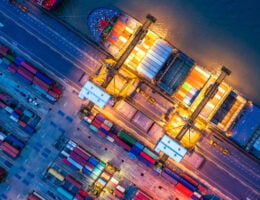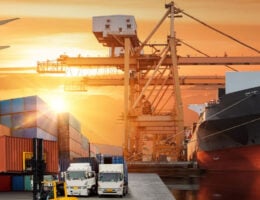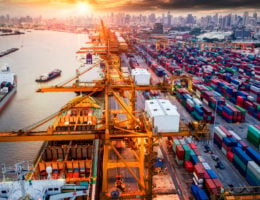For the third week, we continued our Annual Compliance Conference with key customs developments impacting on businesses today. Specifically, we discussed the reform of the Union Customs Code in the EU, key trending customs developments in EMEA, and different methods of driving significant financial savings in global supply chains.
On 17 August 2023, the EU Commission adopted the implementing regulation regarding the reporting rules applicable during the transitional phase of the Carbon Border Adjustment Mechanism (CBAM).
The CBAM formally entered into force on 17 May 2023. It requires importers to report the so-called ’embedded emissions’ of certain (mostly industrial) products and of electricity imported into the EU in order to ensure equivalent carbon pricing for imports and domestic (i.e., EU) products and electricity.
Baker McKenzie’s Import and Trade Remedies blog recently published Business consequences and recommendations on the tightened import ban on iron and steel imposed by the EU, which can be found here.
Baker McKenzie’s Sanctions Blog published the alert titled Blog Series: Sanctions Enforcement Around the World, the Belgian Perspective on 26 June 2023. Read the article via the link here. Please also visit our Sanctions Blog for the most recent updates.
On 19 June 2023, the UK’s new DCTS entered into force, replacing its previous Generalized Scheme of Preferences regime. Under the WTO Agreements, developed countries can grant non-reciprocal preferential treatment to products originating in developing and least developed countries, referred to as “special and differential treatment” (S&D) provisions, normally referred to as a GSP. Countries that grant preferential treatment through a GSP determine eligible countries and S&D provisions unilaterally.
World Trade Organization Members laid out several key principles for determining the customs value of imported goods in the 1995 Customs Valuation Agreement with the aim of ensuring that the value of Members’ tariff concessions would not be nullified or undermined. Nonetheless, the WTO is – incorrectly – seldomly considered as a relevant forum for addressing customs valuation issues.
The European Commission previously announced plans to include binding valuation information decisions in its customs legislation. The Commission has published the draft Delegated Regulation and obtained feedback from a public consultation, which ended on 18 January 2023. The Commission describes this move as the completion of an already well-established legal and operational framework for issuing decisions relating to binding tariff classification information and binding origin information.
On 15 February 2023, the World Customs Organization hosted a Symposium on E-Commerce and Customs Valuation. Several key challenges were identified: the fragmentation in the system due to data overload from low level shipments; the consequent shortfalls within data systems and processing; and compliance and enforcement challenges. The sessions provided a high level overview from the WCO and World Trade Organization of the current scope of challenges and questions to consider, and featured substantive presentations on the challenges faced by national Customs Authorities with input from the private sector in navigating the rapidly growing cross-border e-commerce trade.
On 13 December 2022, a provisional agreement has been reached between the EU Council and the European Parliament on the Carbon Border Adjustment Mechanism (CBAM). This mechanism will be set up to align the price of carbon for EU products covered by the EU Emission Trading Scheme with the price of carbon for imported goods from outside the EU. CBAM will contribute to ensure that the climate efforts of the EU are not undermined by shifting EU production to countries with less ambitious climate ambitions.
Latest Customs Audit and Enforcement Trends in Europe and the United Kingdom
In this session, our speakers discuss the legal framework and practical issues related to customs audits in Europe and the United Kingdom, areas of importance for EU and UK customs authorities during audits, and how to effectively prepare for and navigate customs audits. They also share key EU and UK customs enforcement updates and priorities, to include the latest developments relating to forced labor laws.








